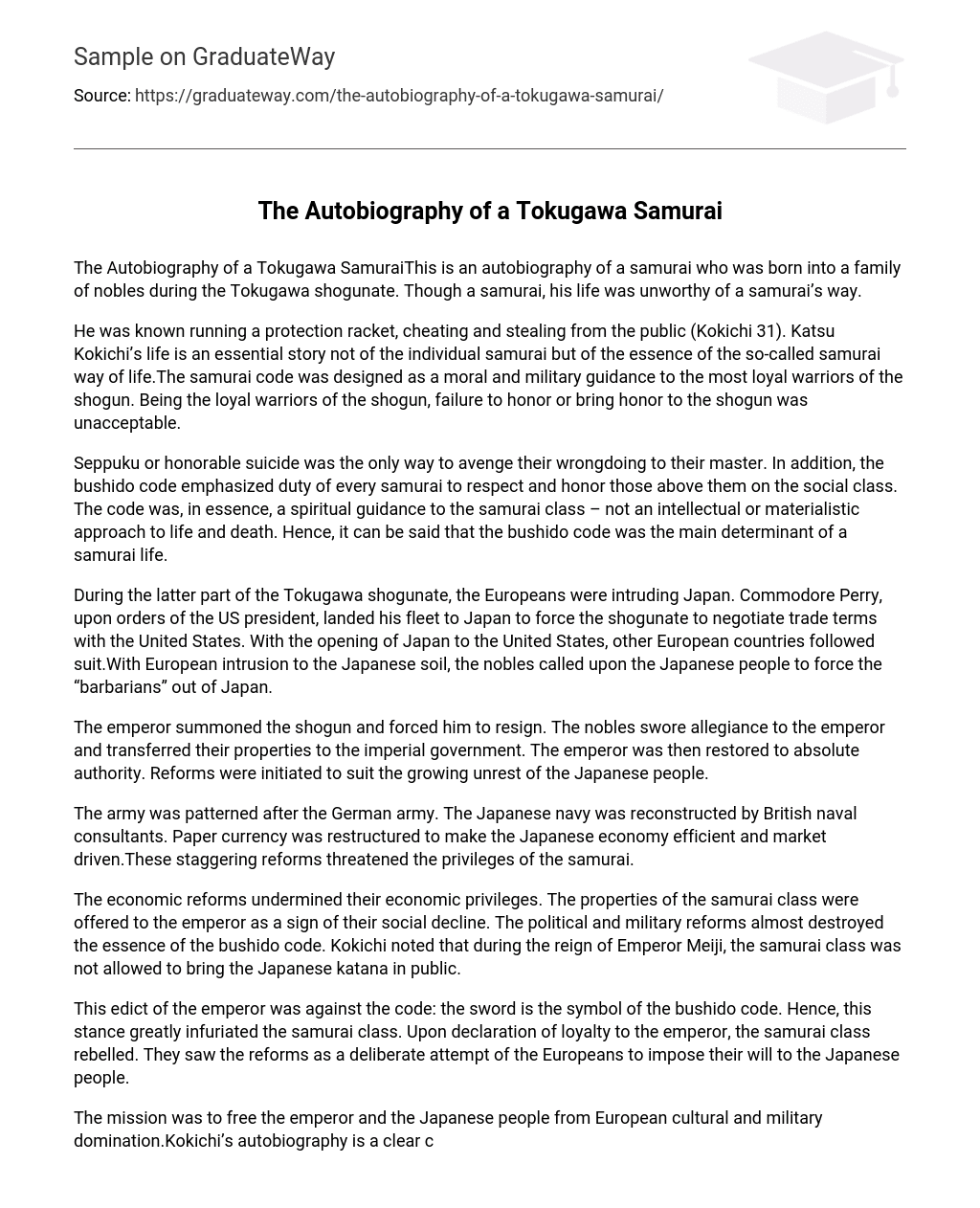The Autobiography of a Tokugawa SamuraiThis is an autobiography of a samurai who was born into a family of nobles during the Tokugawa shogunate. Though a samurai, his life was unworthy of a samurai’s way.
He was known running a protection racket, cheating and stealing from the public (Kokichi 31). Katsu Kokichi’s life is an essential story not of the individual samurai but of the essence of the so-called samurai way of life.The samurai code was designed as a moral and military guidance to the most loyal warriors of the shogun. Being the loyal warriors of the shogun, failure to honor or bring honor to the shogun was unacceptable.
Seppuku or honorable suicide was the only way to avenge their wrongdoing to their master. In addition, the bushido code emphasized duty of every samurai to respect and honor those above them on the social class. The code was, in essence, a spiritual guidance to the samurai class – not an intellectual or materialistic approach to life and death. Hence, it can be said that the bushido code was the main determinant of a samurai life.
During the latter part of the Tokugawa shogunate, the Europeans were intruding Japan. Commodore Perry, upon orders of the US president, landed his fleet to Japan to force the shogunate to negotiate trade terms with the United States. With the opening of Japan to the United States, other European countries followed suit.With European intrusion to the Japanese soil, the nobles called upon the Japanese people to force the “barbarians” out of Japan.
The emperor summoned the shogun and forced him to resign. The nobles swore allegiance to the emperor and transferred their properties to the imperial government. The emperor was then restored to absolute authority. Reforms were initiated to suit the growing unrest of the Japanese people.
The army was patterned after the German army. The Japanese navy was reconstructed by British naval consultants. Paper currency was restructured to make the Japanese economy efficient and market driven.These staggering reforms threatened the privileges of the samurai.
The economic reforms undermined their economic privileges. The properties of the samurai class were offered to the emperor as a sign of their social decline. The political and military reforms almost destroyed the essence of the bushido code. Kokichi noted that during the reign of Emperor Meiji, the samurai class was not allowed to bring the Japanese katana in public.
This edict of the emperor was against the code: the sword is the symbol of the bushido code. Hence, this stance greatly infuriated the samurai class. Upon declaration of loyalty to the emperor, the samurai class rebelled. They saw the reforms as a deliberate attempt of the Europeans to impose their will to the Japanese people.
The mission was to free the emperor and the Japanese people from European cultural and military domination.Kokichi’s autobiography is a clear contradiction of the samurai way of life. He admitted stealing from the pockets of both his mother and peers, a clear violation of the code. He also admitted lying about his identity at a toll at Hakone in order to get access to that province (which was out of his jurisdiction) (Kokichi 59).
This was a clear violation of regulations created by the Tokugawa shogunate to control travel. In short, Kokichi’s autobiography suggested things that were happening in Japan at the start of the Meiji era. Work CitedKokichi, Katsu. Musuis Story: The Autobiography of a Tokugawa Samurai.
Arizona University: University of Arizona Press, 1991.





